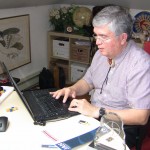Millions sought NAHO information

By Greg Macdougall
OTTAWA – In its last full year before being shut down by the 2012 federal budget, the National Aboriginal Health Organization had nearly 5 million hits to its website.
Over 60 per cent of the visits were by community members, the majority of whom were women, while the other 40 percent were health practitioners, educators, researchers and students.
“We’re seen as a trusted source of information,” says Simon Brascoupé, NAHO’s Acting Chief Executive Officer from June 2011 until its closure. “Government unfortunately is not seen as a trusted source of information even though the information they do provide is based on sound evidence. Aboriginal people want to hear it from a trusted source within the Aboriginal community, which was NAHO.”
The organization ceased its full operations at the end of June 2012, and formally closed its doors at the end of December. But Brascoupe, Anishinabeg/ Haudenausanee , Bear Clan, of Kitigan Zibi Anishinabeg First Nation in Quebec, says the culturally-specific knowledge translation of health research accumulated by NAHO in its 12 years of existence will be available for a limited time.
“NAHO as a spiritual body, of information on health for First Nations, Inuit, and Métis – it’s still there, it’s still available on the internet,” he says.
The website (www.naho.ca) will remain online for five years, and arrangements have also been made with the University of Ottawa’s Medical School to house all the organization’s documents on their library website. There were 360,000 information downloads from the NAHO website in the year before its offices closed. The Journal of Aboriginal Health was the most popular download area on the site; the most downloaded reports and studies were on the subjects of midwifery and traditional knowledge, while visitors search for information on all aspects of health, such as diabetes, heart concerns and cancer.
“You don’t know what’s lost until it’s taken away from you,” says Brascoupé, noting that there was a significant outcry from a lot of national health and research organizations that recognized the important work that NAHO was doing.
The Health Canada budget decision cut an overall 10 per cent of funding, but specifically targeted national-level “headquarter” programs. This preserved various regional Aboriginal direct programs, but resulted in the complete shutdown of NAHO.
Some similar work is done by other organizations at a local level, he says, and some of NAHO’s programs have been taken on by other Aboriginal organizations or universities. But other NAHO programs – like the National Aboriginal Role Model Program –were too expensive for anyone to take on.
“Youth speaking to youth is important … they want to hear it from their peers, so that program was excellent in terms of getting messages out,” Brascoupe says.
“Health issues change, priorities change, so there isn’t going to be that new material coming out, and it’s not going to address health issues as the health needs change over the years. I think that’s the biggest area, and I don’t see anybody replacing NAHO.”
Greg Macdougall is a community organizer, educator and media freelancer based in Ottawa. His website is www.EquitableEducation.ca


